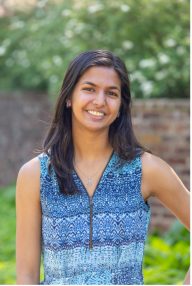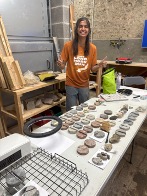An interview with Medha Prakash, PhD Candidate, Class of 2028
August 29, 2025
An interview with Medha Prakash, PhD Candidate, Class of 2028

What first sparked your interest in the geosciences, and what drew you to pursue this path?
My interest with the geosciences started at a young age (you guessed it; I had a rock collection), and it quickly deepened. I was always asking my parents for books and National Geographic magazines about geology. Family trips to the Oregon coast and the Cascades, also sparked an appreciation for nature. I found ways to bring Earth and Space Science into everything, from middle school science fair projects on tsunamis to being the geoscience person on my Science Olympiad or Science Bowl teams. Still, it wasn’t until my second year of college, in the depths of the pandemic, that I began to see this passion as a career path. With encouragement from my teachers and mentors, I made the switch to Environmental Sciences and Statistics, hoping to spend my career studying the geology of other planets.
What confirmed for you that this was the field you wanted to study?
My family and I visited Iceland in December 2019, just before the onset of COVID. It had always been a dream of mine because of the cool geology, the chance to see the northern lights, and the rich history and mythology of the place. Frankly, I thought glaciers were super cool, and I wanted to see one. I remember hiking on one with my family, feeling emotional as I was battered by the rain and wind while looking out at the expanse in front of me. I didn’t realize it then, but that experience truly kickstarted my pursuit of the field. And now, the way I accidentally get absorbed in a research problem. That feeling, when it’s just me and the science, is an incredibly validating reminder of my desire to pursue the field as I move through my graduate degree.
Have you faced any challenges during your educational journey, and how have you worked through them?
Absolutely. Many students in my class, both older and younger, faced real challenges during the pandemic. Completing college from across the country, away from my university and friends, was an extremely confusing time. I was fortunate remote work opened novel opportunities. After watching a guest lecture about astrobiology, chats with the virtual lecturer led me to an internship at a Jet Propulsion Laboratory, studying the origins of life.
I also had to learn how I worked best. Unlike the way we are taught in K-12, there’s no single “right way” in research; there’s only the right way that works for us. I didn’t grow up in a natural science-focused family or have a geology major or geology-heavy curriculum in undergrad, so I’ve been catching up on the field’s foundations while navigating an identity that is different from many around me. The support and mentorship I’ve received from JPL, UVA and UT Austin have been essential in helping me grow, both academically and personally.
Is there a project, field experience, or piece of research you’ve worked on that’s especially meaningful to you?

Sample preparation at Rochechouart
In June 2025, I visited Rochechouart Impact Structure in France with my advisors, Sean Gulick and Cyril Grima, and an external mentor, Ralph Milliken. The project and field excursion came together in a way that felt serendipitous. Just a year earlier, I’d been traveling through Europe, hiking in the Tatras mountains, attending a summer school (Exoplanets by the Lake) and conference (Meteoritical Society Meeting), when I first learned about Rochechoaurt; I didn’t even know it existed. But once I did, I was fascinated. This 23 km eroded impact crater, shaped by long-term water-rock interactions, aligned perfectly with my interests in astrobiology and the origins of life. Hydrothermal systems created by impacts like this provide ingredients necessary for life, making them prime targets in the search for life beyond Earth. It just so happened that my advisor was already discussing impact materials and spectroscopy with Ralph, and we realized this could be a strong direction for my thesis. This was also my first field excursion for my own research. After working primarily with remote sensing data, I am really excited to have something tangible to work with.
What aspects of your graduate studies have you found the most rewarding?
So many things have been valuable. The breadth of knowledge and perspectives I can turn to in the department is phenomenal. My undergraduate program was small and focused less on planetary geosciences, so being able to go to seminars and talk to faculty about new areas of research has been incredible.
Since my first year, I’ve been involved with the Graduate Student Executive Committee, and I’m now Co-President. In my second year, I founded the Planetary Peer Network to connect students across biology, chemistry, astronomy, and geosciences interested in planetary sciences. Working to enhance the graduate experience has been extremely fulfilling, and I’m incredibly thankful for all my peers. I learn so much from them and aspire to be like them in many ways.
My first major fieldwork experiences have come through coursework and my thesis, made possible by the Lewis and Clark Field Fund and my advisors’ support. I really enjoyed the Ice Sheet, Sediment, Sea Level field trip to the Bahamas and the Marine Geology and Geophysics field course as well.
Beyond the department, I’ve connected with many interesting scientists through the Center for Planetary Systems Habitability and enjoyed getting to know students in other fields through CPSH and tennis. It has been interesting to see how their disciplines have evolved compared to the geosciences.
Do you have a sense of what you’d like to do after graduation?
Yes. Planetary science is evolving quickly. I haven’t had the opportunity to TA as a graduate student yet, but I was Head TA for UVA’s Honors Chemistry course, have mentored undergraduate researchers, tutored many students since high school, and have delivered a guest lecture at my old high school (and will be delivering one for the Astrobiology course at UT this fall). I know teaching will be a part of my future, whether at the K-12 level or college level, because I absolutely love it.
I’m passionate about science and research, and I hope to one day be working on samples from another planetary body or be part of a mission collecting them. A future that combines science and teaching in any form would make me incredibly happy.
